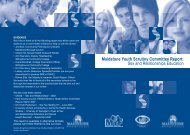Local Healthwatch, health and wellbeing boards and health scrutiny ...
Local Healthwatch, health and wellbeing boards and health scrutiny ...
Local Healthwatch, health and wellbeing boards and health scrutiny ...
You also want an ePaper? Increase the reach of your titles
YUMPU automatically turns print PDFs into web optimized ePapers that Google loves.
<strong>Local</strong> <strong>Healthwatch</strong>,<br />
<strong>health</strong> <strong>and</strong> <strong>wellbeing</strong><br />
<strong>boards</strong> <strong>and</strong> <strong>health</strong> <strong>scrutiny</strong><br />
Roles, relationships<br />
<strong>and</strong> adding value<br />
Health<br />
<strong>and</strong><br />
<strong>wellbeing</strong><br />
<strong>boards</strong><br />
Better<br />
outcomes<br />
for people<br />
<strong>Local</strong><br />
<strong>Healthwatch</strong><br />
Council<br />
<strong>health</strong> <strong>scrutiny</strong>
The Centre for Public Scrutiny<br />
The Centre for Public Scrutiny (CfPS), an independent charity, is the leading<br />
national organisation for ideas, thinking <strong>and</strong> the application <strong>and</strong> development<br />
of policy <strong>and</strong> practice to promote transparent, inclusive <strong>and</strong> accountable public<br />
services. We support individuals, organisations <strong>and</strong> communities to put our<br />
principles into practice in the design, delivery <strong>and</strong> monitoring of public services<br />
in ways that build knowledge, skills <strong>and</strong> trust so that effective solutions are<br />
identified together by decision-makers, practitioners <strong>and</strong> service users.<br />
<strong>Local</strong> Government Association<br />
The <strong>Local</strong> Government Association (LGA) is the national voice of local<br />
government. We work with councils to support, promote <strong>and</strong> improve<br />
local government.<br />
We are a politically-led, cross party organisation which works on behalf of<br />
councils to ensure local government has a strong, credible voice with national<br />
government. We aim to influence <strong>and</strong> set the political agenda on the issues that<br />
matter to councils so they are able to deliver local solutions to national problems.<br />
The LGA covers every part of Engl<strong>and</strong> <strong>and</strong> Wales, supporting local<br />
government as the most efficient <strong>and</strong> accountable part of the public sector.<br />
Visit www.local.gov.uk<br />
Acknowledgements<br />
This publication has been written by Laura Murphy (Independent Consultant<br />
<strong>and</strong> CfPS Expert Adviser) <strong>and</strong> Su Turner from the Centre for Public Scrutiny.<br />
We are very grateful to the following people for their contributions to this<br />
publication.<br />
Lorraine Denoris, <strong>Local</strong> Government Association<br />
Lucy Hamer, Care Quality Commission<br />
Claire Lee, East Sussex County Council<br />
Helen Kenny, West Sussex County Council<br />
We are also grateful to the following Councils for sharing their experience,<br />
challenges <strong>and</strong> learning to date that has been used to inform this<br />
publication.<br />
Bournemouth Borough Council<br />
Derbyshire County Council<br />
Devon County Council<br />
Dorset County Council<br />
Gateshead Council<br />
London Borough of Sutton
Introduction <strong>and</strong> what we know<br />
<strong>Local</strong> authorities, the NHS <strong>and</strong> local community organisations have a history<br />
of working together to improve outcomes for local people. The <strong>health</strong> <strong>and</strong><br />
care reforms introduce some new structures <strong>and</strong> processes <strong>and</strong> working out<br />
how best to bring these together with continuing existing arrangements can<br />
be complex. But what remains constant throughout the transition is a shared<br />
goal: to improve <strong>health</strong>, social care <strong>and</strong> <strong>wellbeing</strong> outcomes for communities.<br />
This guide aims to help local leaders <strong>and</strong> others to underst<strong>and</strong> the<br />
independent, but complementary, roles <strong>and</strong> responsibilities of council <strong>health</strong><br />
<strong>scrutiny</strong>, local <strong>Healthwatch</strong> <strong>and</strong> <strong>health</strong> <strong>and</strong> <strong>wellbeing</strong> <strong>boards</strong>. This guide does<br />
not aim to cover every eventuality; it is a ‘snapshot’ that can be a basis for<br />
discussions about how existing <strong>and</strong> new bodies will work together <strong>and</strong> how<br />
they can build on local agreements <strong>and</strong> legislative requirements.<br />
Health<br />
<strong>and</strong><br />
<strong>wellbeing</strong><br />
<strong>boards</strong><br />
Better<br />
outcomes<br />
for people<br />
<strong>Local</strong><br />
<strong>Healthwatch</strong><br />
Council<br />
<strong>health</strong> <strong>scrutiny</strong><br />
Roles, relationships <strong>and</strong> adding value 3
Council <strong>health</strong> <strong>scrutiny</strong><br />
Councils with social care functions can hold NHS bodies to account for<br />
the quality of their services through powers to obtain information, ask<br />
questions in public <strong>and</strong> make recommendations for improvements that have<br />
to be considered. Proposals for major changes to <strong>health</strong> services can be<br />
referred to the Secretary of State for determination if they are not considered<br />
to be in the interests of local <strong>health</strong> services. The way councils use the<br />
powers is commonly known as ‘<strong>health</strong> <strong>scrutiny</strong>’ <strong>and</strong> forms part of councils’<br />
overview <strong>and</strong> <strong>scrutiny</strong> arrangements. From April 2013 all commissioners <strong>and</strong><br />
providers of publicly funded <strong>health</strong>care <strong>and</strong> social care will be covered by<br />
the powers, along with <strong>health</strong> <strong>and</strong> social care policies arising from the Joint<br />
Strategic Needs Assessments <strong>and</strong> Joint Health <strong>and</strong> Wellbeing Strategies.<br />
Health <strong>scrutiny</strong> also has a valuable pro-active role; helping to underst<strong>and</strong><br />
communities <strong>and</strong> tackle <strong>health</strong> inequalities.<br />
<strong>Local</strong> <strong>Healthwatch</strong><br />
<strong>Local</strong> <strong>Healthwatch</strong> will be the local consumer champion for <strong>health</strong> <strong>and</strong> social<br />
care representing the collective voice of people who use services <strong>and</strong> the<br />
public. It will build up a local picture of community needs, aspirations <strong>and</strong><br />
assets <strong>and</strong> the experience of people who use services. It will report any<br />
concerns about services to commissioners, providers <strong>and</strong> council <strong>health</strong><br />
<strong>scrutiny</strong>. It will do this by engaging with local communities including networks<br />
of local voluntary organisations, people who use services <strong>and</strong> the public.<br />
Through its seat on the <strong>health</strong> <strong>and</strong> <strong>wellbeing</strong> board, local <strong>Healthwatch</strong> will<br />
present information for the Joint Strategic Needs Assessment <strong>and</strong> discuss<br />
<strong>and</strong> agree with other members on the Board a Joint Health <strong>and</strong> Wellbeing<br />
Strategy. It will also present information to <strong>Healthwatch</strong> Engl<strong>and</strong> to help<br />
form a national picture of <strong>health</strong> <strong>and</strong> social care. <strong>Local</strong> authorities will need<br />
to ensure that their local <strong>Healthwatch</strong> operates effectively <strong>and</strong> is value for<br />
money; managing this through their local contractual arrangements.<br />
Health <strong>and</strong> <strong>wellbeing</strong> <strong>boards</strong><br />
Health <strong>and</strong> <strong>wellbeing</strong> <strong>boards</strong> are committees of councils with social care<br />
responsibilities, made up of local councillors, directors of public <strong>health</strong>, adult<br />
social services <strong>and</strong> children’s services; clinical commissioning groups; <strong>and</strong><br />
local <strong>Healthwatch</strong>. They will collectively take the lead on improving <strong>health</strong><br />
<strong>and</strong> <strong>wellbeing</strong> outcomes <strong>and</strong> reducing <strong>health</strong> inequalities for their local<br />
communities. Although set up with a minimum prescribed membership,<br />
how Boards operate will be different in response to local circumstances.<br />
Health <strong>and</strong> <strong>wellbeing</strong> <strong>boards</strong> are an executive function of the council <strong>and</strong> are<br />
responsible for identifying current <strong>and</strong> future <strong>health</strong> <strong>and</strong> social care needs<br />
4<br />
<strong>Local</strong> <strong>Healthwatch</strong>, Health <strong>and</strong> Wellbeing Boards <strong>and</strong> Scrutiny
<strong>and</strong> assets in local areas through Joint Strategic Needs Assessments; <strong>and</strong><br />
developing Joint Health <strong>and</strong> Wellbeing Strategies to set local <strong>health</strong> <strong>and</strong> social<br />
care priorities, providing a framework for the commissioning of local <strong>health</strong><br />
<strong>and</strong> social care services. Individual Board members will be held to account in<br />
different ways (for example, clinical commissioning groups are authorised <strong>and</strong><br />
assessed by the NHS Commissioning Board) but <strong>health</strong> <strong>and</strong> <strong>wellbeing</strong> <strong>boards</strong><br />
can also be collectively held to account for their effectiveness through council<br />
<strong>scrutiny</strong>.<br />
All three have a role to play in the way local services are planned <strong>and</strong> delivered.<br />
How they interact with each other will have a direct influence on improving<br />
outcomes for communities <strong>and</strong> people who use services. The ‘commissioning<br />
cycle’ provides a number of opportunities for each function to add value.<br />
Copyright © 2011, Re-used with the permission of The Health <strong>and</strong> Social Care<br />
Information Centre. All rights reserved<br />
Roles, relationships <strong>and</strong> adding value 5
Working together for better outcomes<br />
<strong>Local</strong> structures <strong>and</strong> ways of working will be different. With a focus on the fundamental principle of<br />
improving outcomes for local people, there are opportunities for bodies to better work together <strong>and</strong><br />
add value to each other’s work. Here are just some ways that each can bring value to the other.<br />
• Share information from<br />
networks of voluntary <strong>and</strong><br />
community groups.<br />
• Gather <strong>and</strong> present<br />
evidence <strong>and</strong> information<br />
for Joint Strategic Needs<br />
Assessments <strong>and</strong> support<br />
council <strong>scrutiny</strong> reviews.<br />
• Use good public<br />
engagement to<br />
demonstrate the<br />
‘real-time’<br />
experiences of<br />
people who use services.<br />
• Highlight concerns about<br />
service to council <strong>health</strong><br />
<strong>scrutiny</strong>.<br />
• Cascade information to<br />
people who use services<br />
<strong>and</strong> the public about<br />
services that are available.<br />
<strong>Local</strong><br />
<strong>Healthwatch</strong><br />
Health<br />
<strong>and</strong><br />
<strong>wellbeing</strong><br />
<strong>boards</strong><br />
Working<br />
together to<br />
add value<br />
Council<br />
<strong>health</strong> <strong>scrutiny</strong><br />
• Bring together individual<br />
<strong>and</strong> organisational<br />
knowledge, expertise<br />
<strong>and</strong> experience.<br />
• Develop an area-wide<br />
view of <strong>health</strong> <strong>and</strong> social<br />
care needs <strong>and</strong> resources<br />
through the Joint Strategic<br />
Needs Assessment.<br />
• Agree area-wide<br />
alignment of services to<br />
deliver improved <strong>health</strong><br />
<strong>and</strong> <strong>wellbeing</strong> through<br />
the Joint Health <strong>and</strong><br />
Wellbeing Strategy.<br />
• Facilitate shared<br />
underst<strong>and</strong>ing of<br />
information to improve<br />
outcomes from decision<br />
making.<br />
• Be a bridge between professionals <strong>and</strong> people who use services.<br />
• Bring a collective memory of public engagement, policy development <strong>and</strong> local knowledge about<br />
community needs <strong>and</strong> assets.<br />
• Be a valuable ‘critical friend’ throughout transition <strong>and</strong> beyond.<br />
• Evaluate policies arising from processes <strong>and</strong> decisions <strong>and</strong> outcomes from services.<br />
• Consider whether service changes are in the best interests of the local <strong>health</strong> service.<br />
• Carry out pro-active qualitative reviews that can inform <strong>and</strong> enhance policy <strong>and</strong> services.<br />
Listening <strong>and</strong> responding to communities <strong>and</strong> people who use services is fundamental to each function<br />
but each will have different reasons <strong>and</strong> ways to gather views <strong>and</strong> experiences. Sharing information <strong>and</strong><br />
expertise is just one example of how value can be added at different points throughout the cycle<br />
of assessing need, devising strategies, commissioning <strong>and</strong> providing services.<br />
6<br />
<strong>Local</strong> <strong>Healthwatch</strong>, Health <strong>and</strong> Wellbeing Boards <strong>and</strong> Scrutiny
How might this work<br />
The following basic scenarios are examples of how the three functions might<br />
complement rather than duplicate each other’s work.<br />
Scenario 1: Refreshed Joint Strategic Needs Assessments<br />
indicate a need for integrated <strong>health</strong> <strong>and</strong> social care teams<br />
aligned with GP practices:<br />
Health <strong>and</strong> <strong>wellbeing</strong><br />
board<br />
<strong>Local</strong> <strong>Healthwatch</strong><br />
Council <strong>health</strong><br />
<strong>scrutiny</strong><br />
The Board has a duty to support integrated<br />
services <strong>and</strong>, reflecting on the Joint Strategic<br />
Needs Assessment decides to include<br />
integrated teams as a priority in Joint Health<br />
<strong>and</strong> Wellbeing Strategy.<br />
Undertakes local research about what people<br />
who use services are looking for, identifies<br />
gaps in service provision <strong>and</strong> feeds the<br />
outcomes into the <strong>health</strong> <strong>and</strong> <strong>wellbeing</strong><br />
board to influence the Joint Health <strong>and</strong><br />
Wellbeing Strategy.<br />
Examines the process in light of councillors’<br />
knowledge of their local area <strong>and</strong> makes<br />
recommendations about how the people<br />
who use services, particularly vulnerable<br />
groups, can be informed about changes to<br />
services. Six months after implementation<br />
of the strategy, it assesses what impact<br />
the changes have had <strong>and</strong> makes<br />
recommendations for improvement.<br />
Roles, relationships <strong>and</strong> adding value 7
Scenario 2: An issue related to <strong>health</strong> inequalities: a low uptake<br />
of child vaccination in particular wards:<br />
Health <strong>and</strong> <strong>wellbeing</strong><br />
board<br />
<strong>Local</strong> <strong>Healthwatch</strong><br />
Council <strong>health</strong><br />
<strong>scrutiny</strong><br />
The refreshed Joint Strategic Needs<br />
Assessment indicates a low uptake which<br />
has implications for <strong>health</strong> <strong>and</strong> social care in<br />
some council wards. Because the reasons are<br />
unclear, the <strong>health</strong> <strong>and</strong> <strong>wellbeing</strong> board asks<br />
<strong>health</strong> <strong>scrutiny</strong> to review the issue.<br />
Through their seat on the <strong>health</strong> <strong>and</strong><br />
<strong>wellbeing</strong> board, local <strong>Healthwatch</strong> were<br />
involved in reviewing the Joint Strategic<br />
Needs Assessment, <strong>and</strong> it now uses it’s local<br />
networks to gather views about why some<br />
children are not being immunised <strong>and</strong> reports<br />
this to the Board <strong>and</strong> <strong>health</strong> <strong>scrutiny</strong>.<br />
Health <strong>scrutiny</strong> asks local <strong>Healthwatch</strong> to<br />
gather local views. As a result of discussions<br />
with clinical commissioning groups, schools,<br />
<strong>health</strong> visitors <strong>and</strong> social workers, makes<br />
recommendations about ways to improve the<br />
uptake of immunisations. (Alternatively, in a<br />
two-tier area the District/Borough Council in<br />
which the particular wards lie could undertake<br />
the review on behalf of the county council –<br />
this is determined <strong>and</strong> co-ordinated locally to<br />
avoid duplication).<br />
8<br />
<strong>Local</strong> <strong>Healthwatch</strong>, Health <strong>and</strong> Wellbeing Boards <strong>and</strong> Scrutiny
Scenario 3: A reconfiguration of maternity services across<br />
council areas:<br />
Health <strong>and</strong> <strong>wellbeing</strong><br />
board<br />
<strong>Local</strong> <strong>Healthwatch</strong><br />
Council <strong>health</strong><br />
<strong>scrutiny</strong><br />
Providers have proposed this as a solution to<br />
improving outcomes <strong>and</strong> make better use of<br />
available resources. The <strong>health</strong> <strong>and</strong> <strong>wellbeing</strong><br />
board assesses whether the plans fit their<br />
Joint Health <strong>and</strong> Wellbeing Strategy <strong>and</strong><br />
takes a strategic view on the outcomes <strong>and</strong><br />
engagement with the clinical commissioning<br />
groups.<br />
Undertakes a comprehensive exercise<br />
to gather the views from people who use<br />
services <strong>and</strong> the public, checks whether<br />
consultations reflect what is known about<br />
best practice <strong>and</strong> presents views as a <strong>health</strong><br />
<strong>and</strong> <strong>wellbeing</strong> board member <strong>and</strong> to council<br />
<strong>health</strong> <strong>scrutiny</strong> during the formal consultation<br />
process.<br />
Agrees that proposals are a substantial/<br />
significant variation, <strong>and</strong> through joint<br />
arrangements with other councils, engages<br />
in early discussions with the commissioners/<br />
providers regarding policy, plans <strong>and</strong><br />
consultations. It also engages during the<br />
formal consultation stage to analyse the<br />
proposals in a public forum, taking evidence<br />
<strong>and</strong> coming to a conclusion about whether<br />
the proposals are in the best interests of the<br />
local <strong>health</strong> service.<br />
Roles, relationships <strong>and</strong> adding value 9
Pulling out the learning<br />
Fundamental principles<br />
There are some fundamental principles, which have been identified by<br />
councils, these include:<br />
• Improved <strong>health</strong> <strong>and</strong> social care are a common goal.<br />
• Early discussions are vital to ensure no one is left out.<br />
• Everyone has responsibility to develop relationships, not just to<br />
engage formally.<br />
• Good relationships lead to good communication, identifying where<br />
value can be added.<br />
The challenges, myths <strong>and</strong> solutions<br />
Our work has identified a number of challenges for local leaders <strong>and</strong> some<br />
possible ways to achieve solutions. These challenges will be solved according<br />
to their local context <strong>and</strong> are likely to be best overcome where there is a<br />
shared willingness to work together. Whilst each function will have ways to<br />
check their progress, <strong>scrutiny</strong> can cement arrangements for transparency,<br />
inclusiveness <strong>and</strong> accountability.<br />
The challenges<br />
Underst<strong>and</strong>ing roles <strong>and</strong><br />
responsibilities<br />
<strong>Local</strong> governance arrangements<br />
The solutions<br />
Joint workshops to identify<br />
roles <strong>and</strong> responsibilities<br />
Agree membership, working<br />
protocols, values <strong>and</strong> behaviours<br />
Duplication of effort<br />
Defining accountability<br />
Have agreed guidelines,<br />
triggers for all partners<br />
Joint underst<strong>and</strong>ing<br />
of accountability, including<br />
the role of <strong>scrutiny</strong><br />
10<br />
<strong>Local</strong> <strong>Healthwatch</strong>, Health <strong>and</strong> Wellbeing Boards <strong>and</strong> Scrutiny
Relationships – a gaze into the future…<br />
Taking the emerging learning from our work, below is an ‘appreciative’ look<br />
at what roles <strong>and</strong> relationships could look like in “Healthyshire” in 2015.<br />
Representatives from <strong>health</strong> <strong>scrutiny</strong>, local <strong>Healthwatch</strong> <strong>and</strong> the Healthyshire<br />
Health <strong>and</strong> Wellbeing Board meet together with a range of other partners to<br />
evaluate how <strong>health</strong> <strong>and</strong> care outcomes have improved over the last year.<br />
Whole system events are very popular, allowing partners to draw on their<br />
strengths <strong>and</strong> complement each other. The event creates an atmosphere of<br />
‘togetherness’ where partners can contribute or challenge knowing that their<br />
views will be understood <strong>and</strong> acted on. They’ve got to this stage because:<br />
Health <strong>and</strong> <strong>wellbeing</strong> board members are committed to working with<br />
others with clear lines of accountability. They encourage open <strong>and</strong> honest<br />
discussions about the challenges faced by all partners in the new l<strong>and</strong>scape<br />
<strong>and</strong> have dealt with any conflicts quickly <strong>and</strong> openly. By actively seeking <strong>and</strong><br />
sharing information, the Board has developed a comprehensive analysis of<br />
<strong>health</strong> <strong>and</strong> social care needs <strong>and</strong> assets. Balancing those needs against<br />
national <strong>and</strong> local policy it has developed a robust strategy to improve<br />
<strong>health</strong> <strong>and</strong> social care <strong>and</strong> reduce inequalities which is well understood <strong>and</strong><br />
accepted. They work constructively with <strong>health</strong> <strong>scrutiny</strong>, welcoming their<br />
involvement. People who use services <strong>and</strong> the public are central to the<br />
Board’s work, <strong>and</strong> people underst<strong>and</strong> how local agencies are improving<br />
<strong>health</strong> <strong>and</strong> social care outcomes.<br />
<strong>Local</strong> <strong>Healthwatch</strong> has built on the LINk legacy by maintaining volunteer<br />
capacity <strong>and</strong> exp<strong>and</strong>ing their networks to include a wide range of people <strong>and</strong><br />
groups so that a comprehensive voice is heard at the <strong>health</strong> <strong>and</strong> <strong>wellbeing</strong><br />
board <strong>and</strong> this is reflected in strategies <strong>and</strong> commissioning plans across<br />
<strong>health</strong> <strong>and</strong> social care. Problems are quickly brought to the attention of<br />
partners, knowing that they are listened to <strong>and</strong> acted upon. They gather <strong>and</strong> present<br />
views to support reviews carried out by <strong>health</strong> <strong>scrutiny</strong>. They have contributed<br />
to national thinking through their engagement with <strong>Healthwatch</strong> Engl<strong>and</strong>.<br />
Council <strong>health</strong> <strong>scrutiny</strong> has influenced <strong>health</strong> <strong>and</strong> social care in a variety<br />
of ways by encouraging transparency, involvement <strong>and</strong> accountability<br />
throughout the planning <strong>and</strong> delivery of services. Officers <strong>and</strong> councillors<br />
shared their experience <strong>and</strong> knowledge during transition so that relationships<br />
could be built. It’s pro-active reviews of <strong>health</strong> <strong>and</strong> social care themes provide<br />
timely evidence <strong>and</strong> constructive recommendations to commissioners <strong>and</strong><br />
providers. Health <strong>scrutiny</strong> is involved very early on in discussions about<br />
reconfiguration of <strong>health</strong> services <strong>and</strong> takes a view about whether changes<br />
are in the interests of local <strong>health</strong> services. It acts as a ‘bridge’ between<br />
politicians, professionals <strong>and</strong> communities, so that solutions are identified together.<br />
Roles, relationships <strong>and</strong> adding value 11
Putting it into action<br />
We can start by asking the right questions. Here are some that partners<br />
are already asking – you may have other questions that are relevant<br />
to your local area:<br />
1. How do we ensure that we complement not duplicate other’s work<br />
2. How can we best use our roles to add value so that together we<br />
improve outcomes<br />
3. Are we taking the right steps to build effective relationships <strong>and</strong><br />
underst<strong>and</strong>ing of partners’ roles <strong>and</strong> responsibilities (Consider<br />
barriers to effective partnership working too).<br />
4. How will we make sure we work together in transparent, inclusive <strong>and</strong><br />
accountable ways<br />
5. How are we providing leadership<br />
6. What is working well or not so well<br />
For <strong>health</strong> <strong>and</strong> <strong>wellbeing</strong> <strong>boards</strong>:<br />
1. What are we doing to demonstrate that every Board member is an<br />
equal partner<br />
2. How are we sharing learning <strong>and</strong> good practice with our partners <strong>and</strong><br />
neighbours<br />
3. What steps are we taking to ensure that we have integrated working<br />
4. How are we collectively <strong>and</strong> individually demonstrating transparency,<br />
inclusiveness <strong>and</strong> accountability<br />
5. How are we engaging with providers to ensure delivery of outcomes<br />
6. How can we work alongside <strong>health</strong> <strong>scrutiny</strong> to address the wider<br />
determinants of <strong>health</strong><br />
12<br />
<strong>Local</strong> <strong>Healthwatch</strong>, Health <strong>and</strong> Wellbeing Boards <strong>and</strong> Scrutiny
For local <strong>Healthwatch</strong>:<br />
1. How are we balancing our dual role of ‘consumer champion’ <strong>and</strong><br />
policy maker on the <strong>health</strong> <strong>and</strong> <strong>wellbeing</strong> board<br />
2. How have we taken the best of the LINk legacy <strong>and</strong> developed it<br />
3. What are we doing that demonstrates we are getting the widest range<br />
of views, particularly those of the least heard communities<br />
4. Can we demonstrate that we use the feedback we get to impact on<br />
our decision-making<br />
5. What are we doing to make it clear how we will treat any safeguarding<br />
issues we come across<br />
6. What steps are we taking to help <strong>health</strong> <strong>scrutiny</strong> in its role<br />
7. How do we plan to work with the Care Quality Commission <strong>and</strong><br />
<strong>Healthwatch</strong> Engl<strong>and</strong> to exchange information about the quality <strong>and</strong><br />
safety of services<br />
For Council <strong>health</strong> <strong>scrutiny</strong>:<br />
1. How can we best ensure that Joint Strategic Needs Assessments<br />
reflect needs <strong>and</strong> aspirations of local people <strong>and</strong> that Joint Health<br />
<strong>and</strong> Wellbeing Strategies reflect credible priorities that commissioners<br />
follow<br />
2. What steps are we taking to help people underst<strong>and</strong> <strong>scrutiny</strong> <strong>and</strong><br />
how it adds value<br />
3. What are we doing to pro-actively engage with clinicians but also with<br />
professionals outside <strong>health</strong> <strong>and</strong> social care<br />
4. How does <strong>health</strong> <strong>scrutiny</strong> work with national bodies, for example<br />
the NHS Commissioning Board, Monitor <strong>and</strong> the Care Quality<br />
Commission<br />
5. What can we do to be an effective ‘bridge’ between politicians,<br />
professionals <strong>and</strong> communities throughout the commissioning cycle<br />
6. Are we thinking strategically <strong>and</strong> pro-actively about how we can best<br />
use our resources to tackle inequalities <strong>and</strong> keep in touch with the<br />
experience of people who use services<br />
Roles, relationships <strong>and</strong> adding value 13
Websites<br />
The Centre for Public Scrutiny<br />
www.cfps.org.uk<br />
<strong>Local</strong> Government Association<br />
www.local.gov.uk<br />
Care Quality Commission<br />
www.cqc.org.uk<br />
<strong>Healthwatch</strong> Engl<strong>and</strong><br />
http://www.cqc.org.uk/public/about-us/partnerships-other-organisations/<br />
<strong>health</strong>watch<br />
Publications<br />
Health overview <strong>and</strong> <strong>scrutiny</strong>:<br />
Exploiting opportunities at a time of change<br />
http://www.cfps.org.uk/publicationsitem=7008&offset=25<br />
Smoothing the way<br />
http://www.cfps.org.uk/publicationsitem=7081&offset=25<br />
10 questions to ask if you are scrutinising arrangements<br />
for <strong>Healthwatch</strong><br />
http://www.cfps.org.uk/publicationsitem=7005&offset=25<br />
Building successful <strong>Healthwatch</strong> organisations<br />
http://www.local.gov.uk/c/document_library/get_fileuuid=c96a438b-dbb5-<br />
4cfa-8669-8c42a999cbdd&groupId=10171<br />
14<br />
<strong>Local</strong> <strong>Healthwatch</strong>, Health <strong>and</strong> Wellbeing Boards <strong>and</strong> Scrutiny
The Centre for Public Scrutiny<br />
<strong>Local</strong> Government House<br />
Smith Square<br />
London SW1P 3HZ<br />
Tel 044 (0)20 7187 7362<br />
www.cfps.org.uk<br />
CfPS is a registered charity no 1136243<br />
October 2012<br />
L12-693


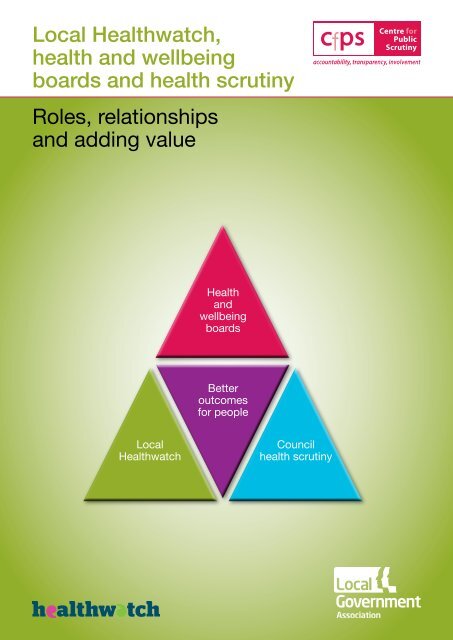
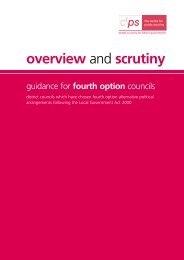


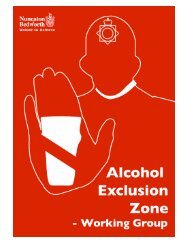
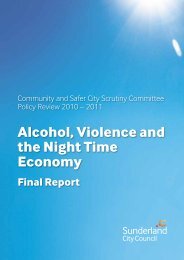

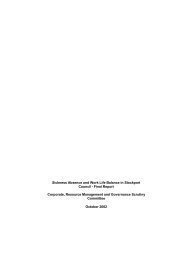
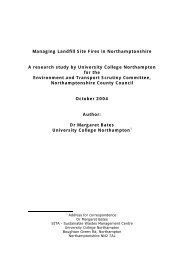


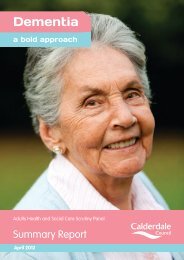

![Absence Management [234kb] - Sunderland City Council](https://img.yumpu.com/28481957/1/184x260/absence-management-234kb-sunderland-city-council.jpg?quality=85)
